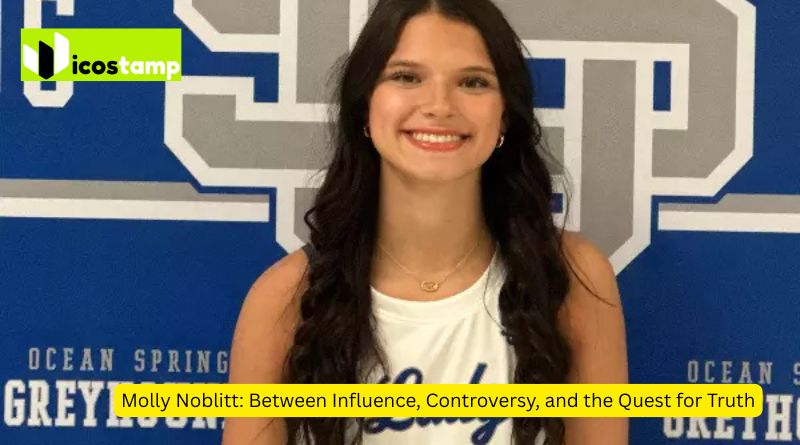In recent years, the name Molly Noblitt has become symbolic of the complex relationship between social media influence, online conflict, and public perception. Once known primarily as a cheerful content creator, Molly has since found herself at the center of controversy surrounding accusations of bullying, online harassment, and the tragic death of another young girl, Aubreigh Wyatt. The case has sparked deep discussions about accountability, misinformation, and the darker side of internet fame.
Who Is Molly Noblitt?
Molly Noblitt is an American teenager who rose to prominence on TikTok, where she posts lip-syncs, dances, lifestyle videos, and short commentaries about everyday life. Known for her confident personality and sense of humor, she quickly gained a following among other teens. Before her rise on social media, Molly was active in athletics, reportedly playing volleyball in high school and maintaining a presence on sports-sharing platforms.
Her early online success came from the relatability of her content. She presented herself as an average high school student with typical teenage experiences, which resonated with audiences. However, as her follower count grew, so did the scrutiny surrounding her behavior and interactions.
The Aubreigh Wyatt Case and Allegations
The tragedy involving Aubreigh Wyatt profoundly changed how the public viewed Molly Noblitt. Aubreigh, a young girl from Mississippi, died by suicide in 2023. Soon after, online users began circulating claims that she had been bullied by Molly and several others. These accusations alleged that the bullying dated back several years and had continued even after Aubreigh’s death.
Supporters of Aubreigh’s family organized online campaigns calling for “justice,” demanding that those accused be held legally accountable. Petitions were created, and hashtags spread widely on social media, naming Molly directly.
However, it is important to note that despite the intense online backlash, no credible or verifiable legal documents or court records confirm that Molly Noblitt was ever arrested, charged, or convicted in connection with Aubreigh Wyatt’s death. Many rumors claiming she was sentenced to prison have been repeatedly disproven or lack evidence.
At one point, reports circulated that a gag order had been placed on Molly, preventing her from discussing the case publicly. Supporters of hers argued that this silenced her right to defend herself, while others saw it as a necessary measure to prevent further harm and online drama.
The Power—and Danger—of Social Media
The situation surrounding Molly Noblitt highlights the immense influence social media holds in shaping public narratives. Platforms like TikTok and Instagram allow information to spread rapidly, often without verification. Within days of Aubreigh’s death, thousands of people had formed opinions about Molly, many condemning her based solely on viral claims.
This kind of digital mob behavior raises significant ethical questions. On one hand, social media gives a voice to victims and helps raise awareness of bullying. On the other, it can quickly turn into a space where people are tried in the court of public opinion without evidence or legal process.
Molly’s case demonstrates how quickly a teenager’s life can change once she becomes the focus of online outrage. In some of her past videos, she appeared to acknowledge the weight of public criticism and the difficulty of navigating fame at such a young age.
What We Still Don’t Know
Despite months of speculation, much about the case remains unclear. There has been no official confirmation of any charges filed against Molly Noblitt or others involved. Because of privacy laws and possible legal restrictions, details about both Aubreigh’s and Molly’s situations are limited.
The lack of verified information has fueled more rumors, with different online groups either vilifying Molly or defending her passionately. What is certain is that Aubreigh Wyatt’s death is a heartbreaking tragedy that has deeply affected her community and brought attention to the seriousness of bullying, whether online or in person.
The Larger Conversation: Accountability and Compassion
Beyond the details of this particular case, the story of Molly Noblitt forces a broader reflection on how society deals with teenage conflict, mental health, and online culture. Several important questions arise:
How can we promote accountability without destroying young lives? When tragedies occur, people seek justice, but it’s crucial to separate verified facts from viral speculation.
What responsibilities do influencers have? Even young content creators must recognize the potential impact of their words and actions on others.
How can schools and parents better intervene in cases of bullying? Many experts agree that early support and intervention can prevent escalation.
What role should social media companies play? Platforms must find ways to curb harassment while allowing fair discussion.
How can we promote mental health awareness? Both victims and those accused in such cases often need support, not public condemnation.
Lessons from the Tragedy
The story of Molly Noblitt and Aubreigh Wyatt is not just about one incident—it’s a mirror reflecting the pressures young people face in today’s hyperconnected world. Social media fame can bring validation, but it can also magnify mistakes and turn private conflicts into global news.
Teenagers, in particular, may not have the emotional tools to handle the intensity of online attention. This case reminds us that every like, share, or comment can have real-world consequences. It also highlights how compassion and understanding are essential when tragedy strikes, especially when full details are not known.
Conclusion
As of today, Molly Noblitt remains a controversial but unconvicted figure, surrounded by rumor, sympathy, and skepticism. The story continues to unfold, with many hoping for truth, closure, and healing for everyone affected.
Whether one views her as a victim of online defamation or as someone who must face moral accountability, her situation underscores a sobering truth: the digital world can elevate or destroy reputations overnight. The challenge for society is to respond with fairness, empathy, and a commitment to facts rather than fear.

